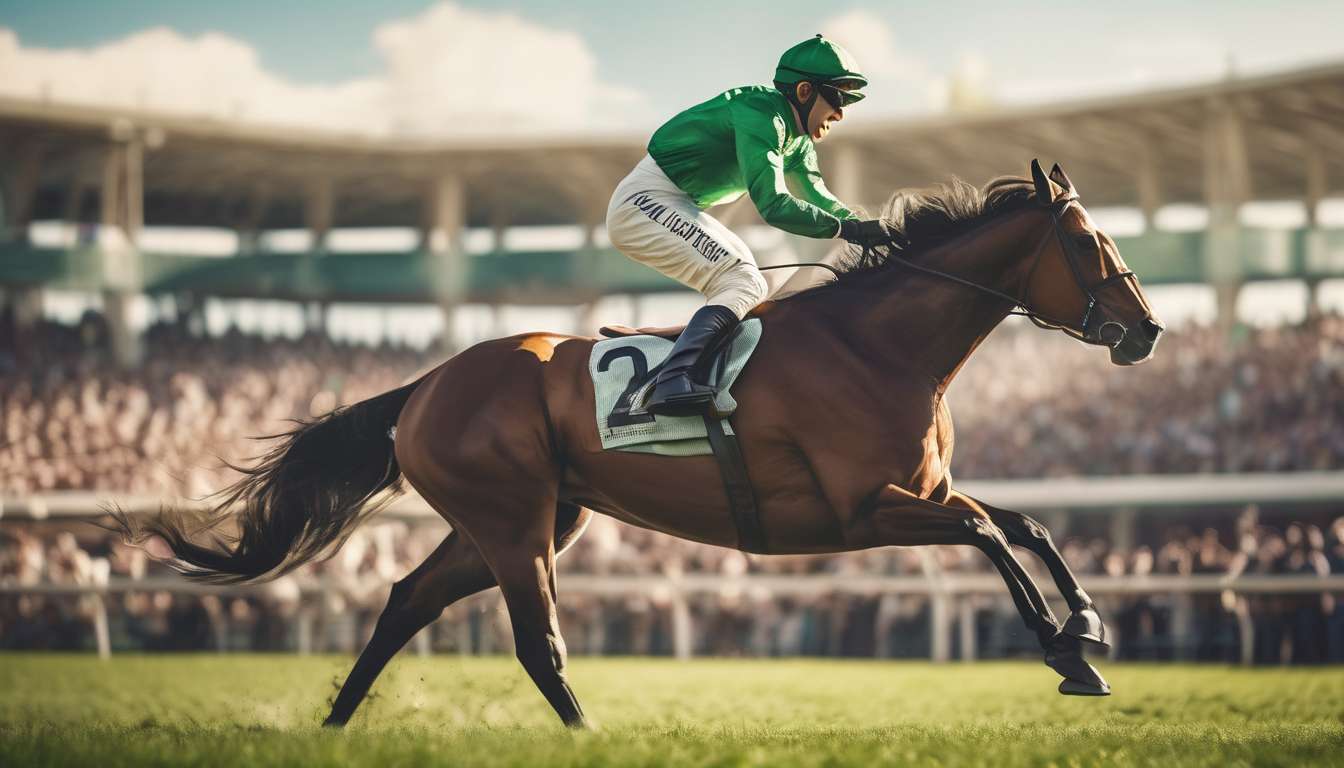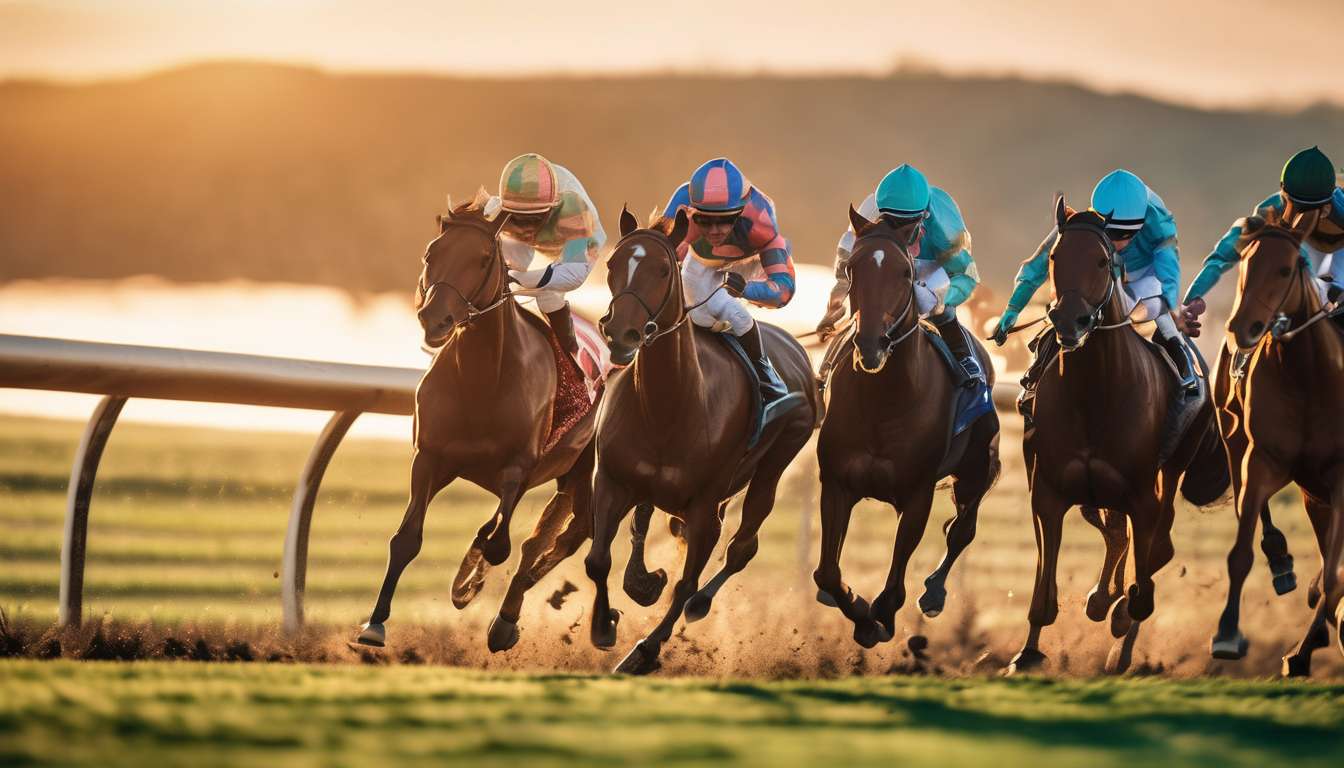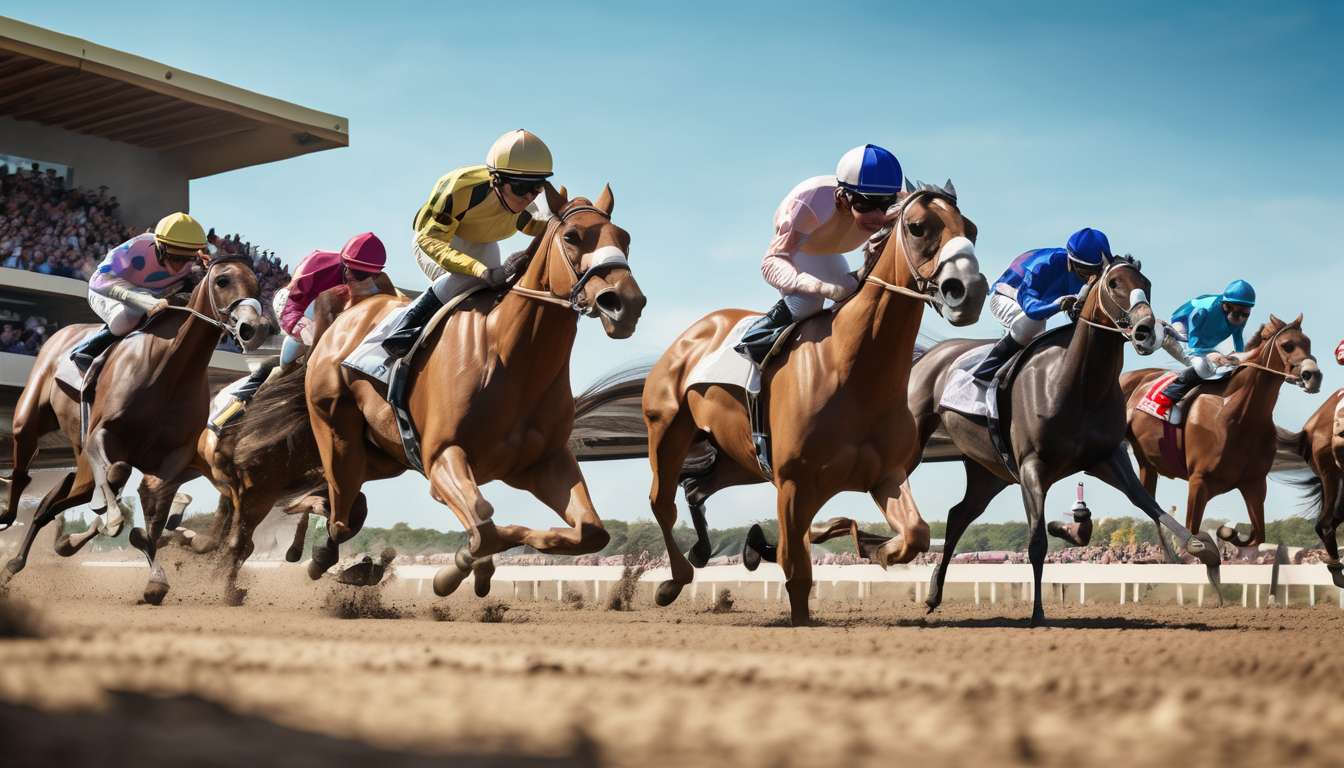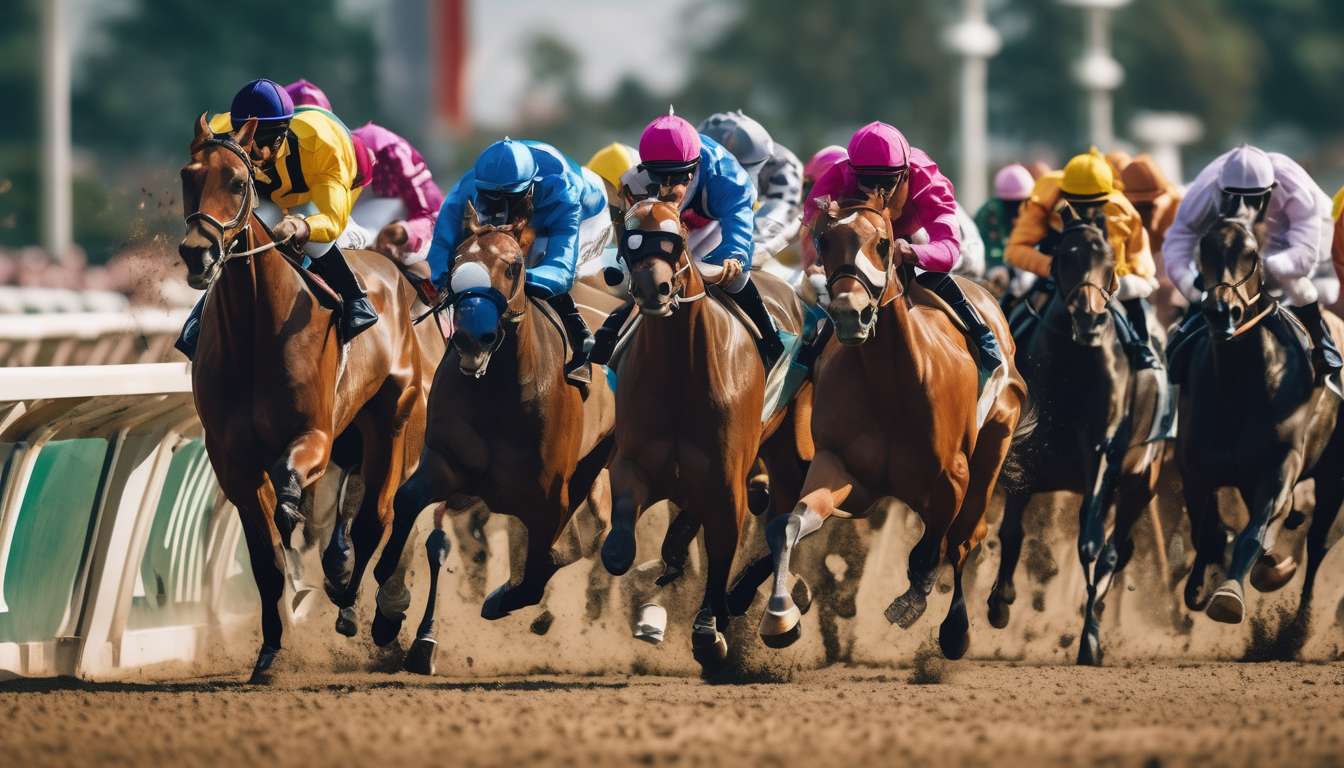The Thrill of Horse Racing
As enthusiasts of the exhilarating world of horse racing, we find ourselves consistently drawn to the excitement and unpredictability of each race. Yet, amidst the thrill, a question often emerges: what makes some horses stand out as favorites?
Factors Contributing to a Horse’s Favored Status
To understand what elevates certain steeds above others, we must consider a variety of factors:
-
Lineage
- The genetic heritage of a horse can greatly influence its potential. Offspring of successful racehorses often inherit speed, stamina, and other desirable traits.
-
Training
- Rigorous and strategic training programs are essential in honing a horse’s abilities and ensuring peak performance on race day.
-
Jockey Expertise
- The skill and experience of a jockey can significantly impact a horse’s performance. A knowledgeable jockey can make split-second decisions that enhance a horse’s chance of winning.
-
Temperament
- A horse’s temperament plays a crucial role in its success. Calm and focused horses are more likely to perform well under the pressures of racing.
-
Health
- A horse’s physical condition must be excellent. Any health issues can hinder performance and therefore affect a horse’s status as a favorite.
Interconnection of Factors
These elements do not operate in isolation but rather intertwine, creating the dynamic that dictates which horses gain the favored title before the starting gun fires.
Exploring the Secrets of Equine Athletes
As we explore these factors, we aim to uncover the secrets behind these equine athletes that captivate our imaginations and define the thrill of the race.
Genetic Influence
Genetic influence plays a crucial role in determining a horse’s potential as a favorite in races. In the world of horse racing, breeding can be the foundation of success. The right genetics give a horse the innate abilities that make it stand out on the track.
Some horses inherit:
- Speed
- Endurance
These traits make them prime candidates for rigorous training programs that maximize their potential.
In our community of racing enthusiasts, we understand that a horse’s lineage often predicts its performance. When we see a horse with a pedigree filled with champions, there’s a sense of excitement and expectation.
However, genetics alone aren’t enough; they must be coupled with effective training. That’s where the expertise of a skilled jockey comes in. A jockey familiar with a horse’s genetic strengths can tailor their riding strategy to leverage those abilities.
Together, genetics, training, and the jockey’s skill form a winning combination, creating favorites that everyone rallies behind.
Training Regimen
In our pursuit of developing a racehorse into a favorite, we focus on a comprehensive training regimen that sharpens their natural abilities and enhances their competitive edge. We understand that while genetics provide the blueprint for potential, it’s the training that actualizes this potential.
Our collective efforts go beyond mere physical conditioning; we create a harmonious environment where horse and jockey can form an unbreakable bond. Together, we develop strategies that play to the horse’s strengths, ensuring they’re well-prepared for the pressures of racing.
We take pride in crafting individualized training plans, tailored to each horse’s unique genetic makeup. By integrating varied exercises that build stamina, speed, and agility, we aim for well-rounded development.
A vital component of our regimen includes fostering a strong rapport between horse and jockey. This partnership is crucial for success, as it builds trust and understanding, allowing them to perform as a seamless unit during the race.
Jockey Skills
A skilled jockey can make all the difference in a race, utilizing their experience and intuition to guide the horse to victory. Winning isn’t just about the horse’s genetics and training—it’s also about how effectively the jockey can communicate and respond to the horse’s needs during the high-stakes moments of a race.
The partnership between horse and jockey is an integral part of racing success. When we watch a race, we become part of that thrilling dynamic.
Jockeys possess a unique blend of skills, including:
- Physical agility
- Strategic thinking
They’ve spent countless hours honing their skills, understanding not only the horse’s physical capabilities but also its psychological cues.
Our admiration grows as we recognize that a jockey’s ability to adapt mid-race can be the deciding factor in turning a well-bred, well-trained horse into a champion.
Together, as spectators and fans, we celebrate this remarkable synergy that elevates horse racing to an art form.
Temperamental Traits
A horse’s distinctive temperamental traits can significantly influence its performance on the racetrack. While genetics play a crucial role in shaping these traits, they aren’t the whole story.
The bond with horses through training is where these temperamental nuances can truly shine and transform. A horse’s willingness and responsiveness often come alive when the right training regimen is combined with an understanding jockey. This partnership is an art form, where a jockey’s ability to read and respond to a horse’s mood can lead to harmony and success.
Together, we cultivate a community where the subtleties of a horse’s temperament are not overlooked. We recognize that traits such as:
- Calmness under pressure
- Eagerness
- Competitive spirit
are assets on race day. Through shared experiences, we cherish how these traits, nurtured by consistent training and sensitive handling by a skilled jockey, turn potential into performance, making some horses true favorites.
Physical Fitness
A horse’s physical fitness is paramount in determining its ability to excel on the racetrack. While genetics play a crucial role in shaping a horse’s potential, breeding programs carefully select bloodlines to ensure that the next generation inherits the speed, stamina, and agility needed for racing.
However, genetics alone aren’t enough. Rigorous training programs are essential to:
- Develop a horse’s muscles
- Enhance its cardiovascular capacity
- Improve overall endurance
We work closely with experienced trainers who tailor workouts to each horse’s needs, ensuring they reach peak performance levels.
Moreover, the bond between the horse and its jockey can’t be underestimated. Jockeys must:
- Understand their horse’s unique strengths
- Know how to maximize them during a race
This partnership enhances the horse’s ability to perform at its best.
Together, through genetics, dedicated training, and a strong jockey-horse relationship, we cultivate a sense of camaraderie and shared purpose in the pursuit of victory.
Race History
A horse’s race history offers valuable insights into its performance patterns and potential future success.
As we analyze these histories, several key factors contribute to a horse becoming a favorite:
- Genetics: A horse’s lineage often plays a crucial role in its racing capabilities. Genetics can indicate natural speed, stamina, and temperament.
- Training Quality: The quality of training a horse receives shapes its development and readiness for competition.
- Jockey Skill: A skilled jockey, familiar with the horse’s strengths and weaknesses, can enhance performance, especially in tight races.
When we look back at previous races, we can identify which horses consistently perform well and adapt to different challenges. This historical data not only helps in predicting future performances but also builds a sense of community among us, the enthusiasts, as we share and discuss these findings.
By appreciating these elements, we feel more connected to the sport, understanding why certain horses become favorites, and eagerly anticipating future races together.
Track Conditions
The condition of the track can significantly influence a horse’s performance, affecting speed and traction. Whether it’s a dry surface or a muddy track, the factors at play challenge both the horse and the jockey.
Genetics often predispose horses to perform better on certain surfaces.
- Some are naturally suited for dry, fast tracks.
- Others excel in heavier, wet conditions.
Training also shapes how a horse handles the track.
- Emphasis is placed on preparing them for varied conditions.
- This ensures they are adaptable and ready for race day.
The bond between horse and rider is crucial, especially when navigating tricky conditions. With genetics, training, and an experienced jockey, we confidently watch our favorites rise to the occasion.
We all enjoy seeing our favorite horses in their element, and track conditions play a huge role in that. On race day, a well-prepared team can make all the difference as the jockey guides the horse through the track’s challenges.
Betting Odds
Betting odds reflect the likelihood of a horse winning a race, guiding us in making informed wagers. When we gather at the racetrack, we’re not just spectators; we’re part of a community united by excitement and strategy.
Factors Influencing Odds:
- A horse’s genetics
- Training regimen
- The skill of its jockey
These elements create a sense of connection among us, as we analyze them together.
Genetics and Training:
- A horse with superior genetics might have an edge, but it’s not solely about pedigree.
- Effective training shapes a horse’s performance, and that’s something we all eagerly discuss.
- We often exchange insights about how various trainers prepare their horses, creating bonds over shared knowledge.
The Jockey’s Role:
- The jockey’s skill in navigating the track is crucial.
- We admire their expertise, knowing that a good jockey can make all the difference.
As we place our bets, we’re not just hoping for a win; we’re sharing in a communal experience.
How are racehorses named and does their name impact their performance?
When we name racehorses, we carefully select names that reflect their lineage, personality, or even bring good luck. A horse’s name can evoke emotions and create a connection with fans.
While it doesn’t directly affect their performance, a powerful or memorable name can influence how people perceive the horse.
Ultimately, it’s the horse’s:
- Training
- Breeding
- Talent
that determine their success on the racetrack, not just their name.
What are the common myths or superstitions associated with horse racing?
When it comes to horse racing, common myths and superstitions abound. From lucky colors to pre-race rituals, beliefs can vary widely among fans and insiders.
Some think a certain number is lucky, while others avoid specific actions for fear of bad luck. These superstitions add an element of excitement and tradition to the sport.
The unique atmosphere created by these beliefs draws us in with its mystery and folklore, making horse racing more than just a sport but a rich tapestry of tradition and intrigue.
How does the diet of a racehorse differ from other types of horses?
In our experience, the diet of a racehorse varies significantly from that of other horses. Racehorses typically require high-energy diets rich in protein, vitamins, and minerals to support their intense training and performance demands.
These specialized diets often include specific supplements to promote:
- Muscle development
- Stamina
- Overall health
Ensuring our racehorses receive proper nutrition is crucial to their success on the track and overall well-being.
Conclusion
When picking a horse to bet on, consider the following key factors:
-
Genetic Influence: Look into the horse’s lineage and breeding to assess its potential performance.
-
Training Regimen: Evaluate the quality and intensity of the horse’s training program.
-
Jockey Skills: Consider the experience and track record of the jockey riding the horse.
-
Temperamental Traits: Pay attention to the horse’s behavior and temperament, as these can affect its performance.
-
Physical Fitness: Assess the horse’s condition and health, ensuring it is fit to race.
-
Race History: Review past race performances to gauge consistency and improvement.
-
Track Conditions: Take into account whether the track surface and weather conditions favor the horse.
Betting Odds: Keep an eye on the odds as they can provide insights into which horses are favored by the betting community.
Make an informed choice by combining all these factors, and enjoy the thrill of the race!



